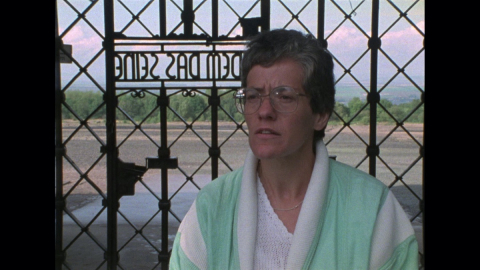Marlis Gräfe, 24. 9. 1987, Buchenwald, Germany
Questions to the narrator
- 00:10What do you say to your young people about what happens here in the second world war?
- 01:16And what do you say to these people about what happened in the Second World War as German history, as part of German history?
- 02:43Is there not a problem in saying the GDR is the good antifascist Germany and is there the other Federal Republic, the bad Germany with, where has the heavy, the German history, this bad history?
- 05:03The GDR is, explained the museum as the new beginning, after fascism. But today we have a rehabilitation which, Prussian history, of Frederick to Bismarck and, Prussian history says, well, militarism. So, how can one rehabilitate Prussian history, and say
Metadata
| Location | Buchenwald, Germany |
| Date | 24. 9. 1987 |
| Length | 06:54 |
Watch and Listen
| Full video (mp4, 6 min) |
| Preview video (mp4, 1 min) |
| Audio track (mp3, 6 min)
|
TranscriptPlease note that this transcript is based on audio tracks and doesn't have to match exactly the video
What do you say to your young people about what happens here in the second world war?
Many young visitors from many countries in this world come to us and I say to our young guests when they come here that in this camp German fascist horror, inhumanity and terror were perpetrated. But I also say to them that in this camp of people humanity was set against this terror. That in this camp, people from different countries, of different religions, of different party allegiances, fought the battle to live and in this battle, they could be the number to fall victim.
And what do you say to these people about what happened in the Second World War as German history, as part of German history?
With regard to these concentration camps or? Yes, I say that these camps were built out of necessity by the German fascists. That means they constructed these camps, firstly to fight the war from within against their own potential enemies. That means, opponents of fascism, that is antifascist. Thousands of communists, social democrats, also Christians were carried off to these camps, to muzzle them, to isolate them from society, to concentrate and to exterminate them in these camps. But I also say that under the term “ungerman”, all sorts of people were brought here, that is criminals, “asocials”, Jehovah's Witnesses, homosexuals, all sorts of people who were herded together in the smallest spaces, were subjected to the terror of the despotism of the fascists.
Is there not a problem in saying the GDR is the good antifascist Germany and is there the other Federal Republic, the bad Germany with, where has the heavy, the German history, this bad history?
The problem is not the fact that two German states exist, but the problem is, how was this history recounted in these two German States. And I am not of the opinion that one can push such a story - it is German history - into oblivion by forgetting it. It is important and it is essential to make clear to young people that lessons must be learnt from this history. This must fundamentally be borne in mind together with the sources of and the possibilities for building up fascism again. That, for example, apart from democratic reforms, an important source is being overcome economically, namely the ownership of the most important nationally-owned means of production. It is important, above all, also to consider this question ideologically. It is also important to consider the question from a legal viewpoint. It is to be understood that with war criminals, with Nazis and war criminals, the trial must be held in the light of the history of both states, until now differently portrayed. And even verdicts in the Dachau trial, for example, referring expressly to Buchenwald, were pronounced by American military courts, but the full consequences were not executed.
The GDR is, explained the museum as the new beginning, after fascism. But today we have a rehabilitation which, Prussian history, of Frederick to Bismarck and, Prussian history says, well, militarism. So, how can one rehabilitate Prussian history, and say we have nothing to do with this bad side of German history?
I see the fact not as a rehabilitation of Prussia and of militarism as such, because you name Frederick who did not become famous through that, Prussian history and, with that this history also has other sides. In considering progress (and that is important, to maintain and to further this tradition) in this question of development that and also new insights and also, if you like, this memorial - if we want to take this example which was re-established in Berlin - I see that largely as a very nice, a very good fact, really, to adapt history, to further history, but in this context, not militarism.
Marlis Gräfe (.)

The biography of Marlis Gräfe cannot be found.
